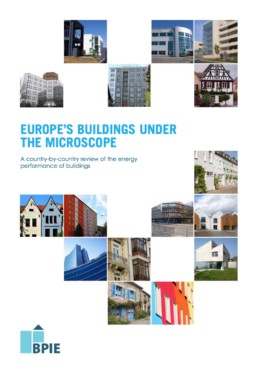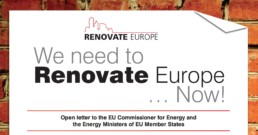Knowledge-Building Workshop on the use of the MFF for Energy Efficient Investments in Buildings
Workshop on the Multi-Annual Financial Framework
Knowledge Building Workshop on the use of the MFF for Energy Efficient Investments in Buildings
 On the 22nd March 2012, the Renovate Europe Campaign organised in Brussels a high-level Workshop on the use of the MFF for energy efficient investment in buildings. The Workshop formed part of a series of events on financing energy efficiency in buildings that will take place in 2012.
On the 22nd March 2012, the Renovate Europe Campaign organised in Brussels a high-level Workshop on the use of the MFF for energy efficient investment in buildings. The Workshop formed part of a series of events on financing energy efficiency in buildings that will take place in 2012.
The Workshop was by invitation only ( see Agenda ) and approximately 60 experts and stakeholders attended to share their experiences and knowledge with the Campaign and, crucially, with each other. A rich exchange of knowledge took place that has produced a series of Recommendations from the meeting.
The Workshop clarified that although there are challenges ahead, there are also many successful examples of financing instruments and partnership models on which to build in the current and future funding periods. Key elements identified include the need to understand investments in energy efficient renovations of buildings as an investment and not as a spending, the need to maintain technical assistance programmes and the need to increasingly demonstrate the benefits of investment in energy efficiency of buildings in order to reinforce the probability of higher investments in the next funding period.
Workshop Documents:
Agenda
Recommendations - Press Release
Workshop Powerpoint Presentations:
Innovative Financing Needed for Europe’s Buildings
Paul Hodson, DG Energy, EC
Funding Energy Performance Projects – Experiences from the Private Sector
Adam McCarthy, Johnson Controls
Energy Efficiency in Buildings: Combining New Financial Instruments with the MFF – Example of JESSICA
Frank Lee, EIB
Technical Assistance Breaks Down Barriers – Success with ELENA
Juan Alario, EIB
Case Study – Partnership Model at Regional Level
Jose Lopez, Julien Berthier, Région Ile-de-France
Experience of Financing Energy Efficiency of Buildings in Germany
Amelie D’Souza, KfW
Workshop Organising Committee:
Adrian Joyce (Campaign Director), Susanne Dyrboel (Rockwool), David Baumgart (BASF), Julie Kjestrup (Danfoss), Céline Carré (Saint Gobain - Isover), Jonna Byskata (UTC), David Turier (Fleishman HiIllard), Laura Vanhué (Independent Expert on European Territorial Energy Efficiency)
For further information, please contact the Campaign Director at adrian.joyce@euroace.org
Investing in energy efficiency in buildings tackles Europe’s budget/growth dilemma says new report
Brussels, 4 November 2011 – A new study on the effects of investing in the renovation of Europe’s buildings underlines that investing in energy efficiency in buildings is a key tool to help balance budgets and bring growth back to the European economy. In 2010 for every one euro invested by the German federal government into loans to energy efficiency measures, five euro of combined tax receipts and expenditure savings were made. With the Energy Efficiency Directive under discussion in the European Parliament and Council, the Study’s findings call into question those who have publicly doubted the ability of national governments to meet the cost of the deep renovation of Europe’s buildings.
The Study, conducted by the Jülich Research Centre, examined the effects on public finances of the promotion of energy efficiency loans and bonuses by the German development bank KfW in 2010. The Federal Government makes budget funds available to KfW under the CO2 Building Rehabilitation Programme through the Federal Ministry of Transport, Building and Urban Development. The programme provides builders with reduced-interest loans or investment bonuses with which they can build or convert their houses or flats into energy-efficient homes. According to the Study, the German State invested 1.4 billion euro in 2010, which created an additional 5.4 billion euro of tax receipts and 1.8 billion euro savings in unemployment benefits. An estimated 340,000 jobs were created or safeguarded as a result.
“At a time when governments across Europe are faced with the difficult challenge of reining in budgets while encouraging growth, this new Study underlines that government investment in the deep renovation of buildings is a win for government finances and a win for the European economy” stated Adrian Joyce, Campaign Director of Renovate Europe. “These new findings serve as a wake-up call to those in Parliament and Council who complain that despite the economic and environmental benefits of deep renovation of buildings we can’t afford to renovate Europe. This is clearly not true! Governments across Europe would be committing an act of political and economic madness in not allocating increasing amounts of their budgets to KfW style programmes.”
The campaign, an initiative of the industry group EuroACE, is vocal in its support for the ambitious proposals made by Claude Turmes MEP on the proposed Energy Efficiency Directive. It argues that a long term 2050 target for deep renovation of Europe’s buildings and obligatory roadmaps for deep renovation are essential to boost economic growth, reduce Europe’s dependency on imported and increasingly expensive fossil fuels and prevent more Europeans falling into fuel poverty. A recent study, launched on 11 October 2011 in Brussels by the campaign, argued that the deep renovation of Europe’s buildings could create up to 1.1 million new jobs in Europe.
Renovating Europe’s buildings: the secret weapon in creating up to 1.1 million direct jobs and saving up to 32% of EU energy consumption
Brussels, 11 October 2011 – Today’s Renovate Europe Day, organized by the Renovate Europe campaign, brings together non-governmental organizations, politicians, academics and industry representatives. The aim of the Renovate Europe campaign, initiated by EuroACE, is to promote the huge - but largely unknown - capacity of deep renovation of buildings as the most effective way to meet the economic and energy challenges that face the EU.
Newly appointed Renovate Europe Campaign Director Adrian Joyce said “This is a wake-up call to our politicians. The potential of Europe’s buildings has been neglected when it comes to economic growth. But all the evidence shows the huge impact deep renovation can have in Europe: up to 1.1 million direct new jobs , 32% of the total primary energy saved. The choice is clear: either continue to burn our Euros on fossil fuels from abroad or invest in deep renovation that creates European jobs today and saves us money tomorrow.”
If the EU wants to meet its energy savings targets, a commitment to deep renovation in the current discussions around the Energy Efficiency Directive is absolutely vital. Adrian Joyce added “The financing to deliver on deep renovation is available and industry is ready to make it happen. What we need is an ambitious Energy Efficiency Directive that creates the legal and policy framework to allow deep renovation to take place.” Renovate Europe is calling upon policymakers to stand by a proposal to renovate 3% of Europe’s public buildings per year and to put in place national roadmaps that will deliver an 80% reduction in energy demand of Europe’s buildings by 2050.
Event speaker Peter Sweatman, Founder and CEO of Climate Strategy & Partners, will illustrate examples of huge returns on investments in energy efficiency measures in buildings, such as a nine fold return on investment in Germany where promotional bank KfW stimulated a total investment of Euro 54 billion from 2006-2009 from a core public investment of Euro 6 billion. Mr. Sweatman will show that the amounts of investment flows required to meet Europe’s 2020 Energy Savings Target are in the order of 0.5-0.8 % of GDP; a level of investment already being surpassed by the KfW scheme in Germany.
New research quantifying Europe’s building stock will be revealed at the event. Produced by the Buildings Performance Institute Europe (BPIE), an independent not-for-profit organization, the research shows that Europe’s existing building stock is about the size of Belgium, 75% of Europe’s buildings are residential and that buildings have the potential to create up to 1.1 million direct new jobs in the construction sector. Providing a vital picture of Europe’s building stock, the BPIE research is a solid basis for policy debate both at the EU and Member State level. “We are convinced that effective policymaking starts with an accurate picture of the challenge and our report is a first attempt at a comprehensive answer to this question” says Oliver Rapf, Executive Director of BPIE. “To improve the energy performance of European buildings in the future we need a good understanding of the present. An efficient monitoring system for policy effectiveness as well as data availability and quality is a prerequisite for successful and ambitious policy making” he added.
Europe's Buildings Under the Microscope
by BPIE , was launched on Renovate Europe Day 2011. It provides the following research and analysis:
- Provide a clear overview of EU building stock (energy use, typology, regulations, etc.)
- Quantify the potential financial and energy savings benefits of increased retrofits
- Identify and propose solutions to gaps and barriers to delivery mechanisms
Feckless Commission fails to deliver on energy efficiency
Industry leaders of some of Europe's most important companies and organisations today slammed the European Commission's absence of courage on buildings efficiency and other energy efficiency improvements on the energy end-use side. The criticism comes as the European Commission releases its proposal for a framework Directive on Energy Efficiency.
The proposal adopted today by the European Commission clearly falls short of addressing Europe’s daunting climate and energy challenges. According to the International Energy Agency (IEA), 2010 was the worst year in history in terms of CO2 emissions, moving the world closer to the point of no return on global warming.
Speaking last week at a UN High-Level Global Sustainability Panel in Helsinki, Climate Commissioner Hedegaard said "by 2016 we'll have 600bn in fossil fuel subsidies. Think what we could do if we invested this in renewables & efficiency". Strong though they are, the Commissioner’s words were not turned into meaningful actions by the rest of the European Commission. As Europe goes through hard economic times, it is justifiable to question the EU’s obsession with subsidizing the use of foreign fossil fuels and prioritizing the building out of energy supply and transmission when investing in the deep renovation of Europe’s building stock could create 2 million local jobs and increase Europe’s energy security.
“We were shocked by the lack of ambition in the Commission’s proposal” says Rick Wilberforce, President of EuroACE. “Europe is already walking on thin, melting ice, yet the European Commission proposes a Directive that experts already consider as a failure. Even the 3% binding renovation target for public buildings was watered-down, the Commission only opting to renovate buildings to minimum standards instead of deep renovation will lead to a significant untapped savings potential whilst at the same time lead to higher costs for public authorities in the future” he added.
Buildings account for 40% of EU energy demand, and applying existing technologies would already allow saving 83% of total energy demand in buildings. It is already estimated that by 2050, a 3% yearly deep renovation rate of Europe’s building stock, would save 32% of the total primary energy used in Europe. These measures are necessary if the EU is going to have a chance of meeting its 2050 CO2 emissions reduction target.
The Energy Efficiency Directive brought hopes for groundbreaking energy efficiency policy in Europe; however the Commission managed to disappoint the expectations of people and stakeholders, only to satisfy reluctant Member States who although talk up their green credentials lack the ambition to set a clear vision of how our societies will deal with tomorrow’s energy and climate challenge.
Open letter to the EU Commissioner for Energy and the Energy Ministers of the European
Dear Commissioner Oettinger, Dear Ministers,
Recent environmental disasters as well as turmoil in the energy market have underlined the energy challenges that we face. We need affordable, secure and safe energy for our economies to grow and for our citizens to prosper.
You have the opportunity to help address this once in a generation challenge. You can continue the policies of the past or pursue a better, brighter energy future by making Europe’s buildings more energy efficient.
A deep renovation of Europe’s existing buildings will save 32% of the total primary energy used in Europe. This saving is equivalent to the combined total energy production of the European coal and nuclear energy sectors or a saving of 4 billion barrels of foreign oil per year.1
Our companies and trade associations stand ready and willing to help you Renovate Europe. Working together we can create local jobs, reduce Europe’s CO2 footprint and ensure that we are less likely to suffer from foreign energy shocks.
We urge you to ensure that energy saving is made a national and European priority. You can make a start by ensuring that energy saving is given equal weight to energy production in Europe’s 2050 Energy Road Map.
Yours faithfully,
Marc Jardinier, CEO, Aereco • Jean-François Heris, CEO, AGC Glass Europe • Bruno Lacroix, Chairman & CEO, ALDES • Philippe Delpech, President, Carrier EMEA • Richard Pemberton, Chief Executive Officer, Celotex Ltd • Niels B. Christiansen, CEO, Danfoss A/S • Nils Borg, Executive Director, ECEEE • Steve Winslet, Managing Director, EcoTherm Insulation (UK) Ltd • Jan te Bos, Director General, Eurima • Rick Wilberforce, President, EuroACE Monica Frassoni, President, European Alliance to Save Energy • Jan Denneman, President, European Lamp Companies’ Federation • Bertrand Cazes, Secretary General, Glass for Europe • Luc Theis, Group Vice President, Guardian Industries Corp. • Edwin Pittomvils, Vice President and General Manager Europe & North Africa, Honeywell Building Solutions • Nick Webster, Vice President, Huntsman Polyurethanes Europe • Agostino Renna, Vice President and General Manager EMEA, Energy Solutions, Johnson Controls • Gene Murtagh, CEO, Kingspan Group • Tony Robson, Group CEO, Knauf Insulation Philip M. Ramsey, VP Technology – Building Products R&D, NSG Group • Väinö Tuomisalo, CEO, Paroc Group • Garrett Forde, Chief Executive Officer, Philips Lighting Solutions, EMEA • Oliver Loebel, Secretary General, PU Europe • Olivier Chapelle, CEO, Recticel nv/sa • Jakob Sørensen, Senior Vice President, Group Corporate Affairs, Rockwool International A/S • Jean-Pierre Floris, CEO, Saint-Gobain Glass • Benoît Carpentier, CEO, Saint-Gobain Insulation • D. Michael Donnelly, President & General Manager - Performance Films, Solutia Inc. • Jørgen Tang-Jensen, CEO, VELUX Group • Leif Frilund, President and CEO, Walki Group



